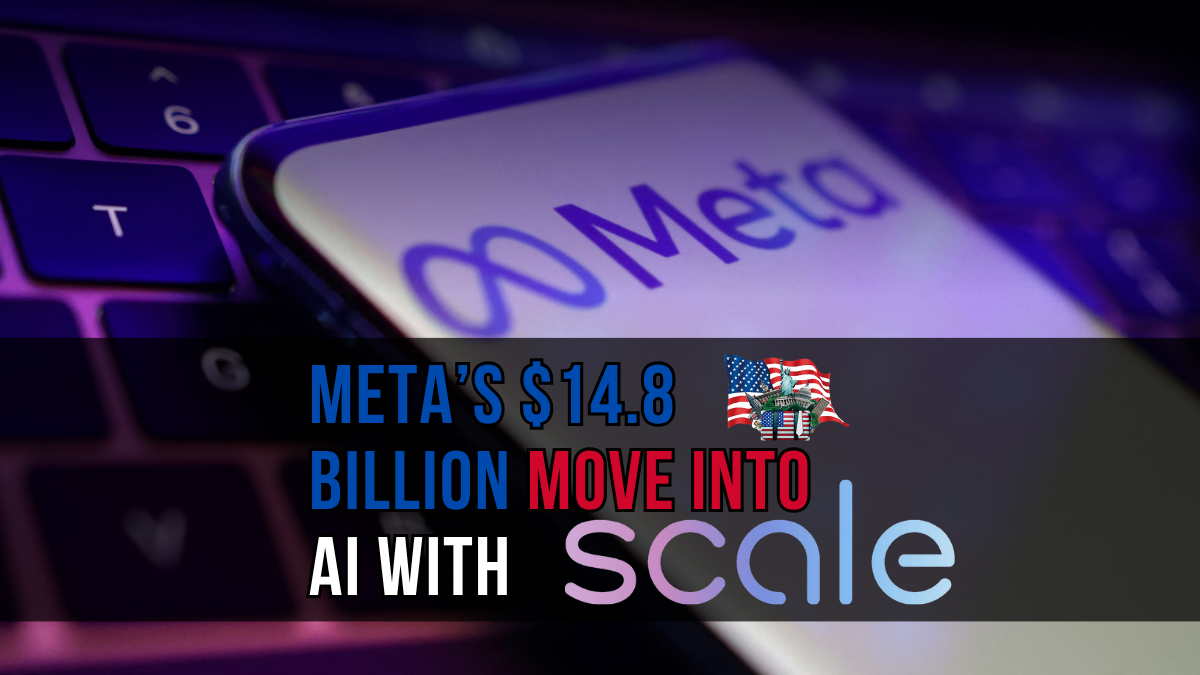Meta Platforms recently made waves by agreeing to acquire a 49% stake in Scale AI for $14.8 billion. This strategic move has positioned the tech giant at the forefront of enterprise AI capabilities, while also sparking substantial regulatory and antitrust concerns. Scale AI, known for its mastery in providing labeled training data for sophisticated AI tools like OpenAI’s ChatGPT, is now under the scrutiny of global tech and policy watchers.

What is Scale AI, and Why is Meta Investing?
Founded in 2016, Scale AI specializes in creating high-quality labeled datasets that are critical for developing machine learning and AI systems. With major clients like OpenAI, Microsoft, and Cisco, Scale’s expertise aligns well with Meta’s ambitions to dominate AI development in areas such as large language models (LLMs).
Meta’s investment strengthens its AI capabilities, particularly after facing criticism for falling behind competitors like Google and OpenAI in cutting-edge AI advancements. By joining forces with Scale AI, Meta gains access to one of the most valuable assets in AI development today data. Scale is projected to generate over $2 billion in revenue this year, highlighting its robust standing in the field.
The Regulatory Challenges Surrounding Meta’s Acquisition
Meta’s purchase has triggered antitrust scrutiny for several reasons. While a 49% non-voting stake avoids regulatory thresholds that mandate automatic reviews, U.S. regulators like the Federal Trade Commission (FTC) may still examine this deal if they suspect anti-competitive practices.
Meta’s previous acquisitions of Instagram and WhatsApp, which remain focal points in an ongoing antitrust lawsuit, have laid a contentious foundation for regulatory concerns around its Scale AI deal. According to industry experts, the structure of the investment raises questions about whether it was designed strategically to dodge antitrust oversight.
Adding to the complexity, Scale AI’s existing customers, including Google, have reportedly reconsidered their partnerships following Meta’s announcement. This could pose further challenges to Meta as it navigates both the business and regulatory landscape.
Implications for the AI Industry
1. Boosting Meta’s AI Capability
Meta’s “superintelligence” lab, led by Scale AI CEO Alexandr Wang, promises unprecedented advancements in AI, from refining LLMs to developing entirely new models. This aligns with Meta CEO Mark Zuckerberg’s emphasis on becoming a leader in AI innovation.
2. Data Access as a Competitive Edge
Access to Scale AI’s vast resources could help Meta accelerate its development of revolutionary AI tools. However, exclusivity in data access poses fairness and competition concerns, especially for other companies relying on Scale for neutral services.
3. Heightened Regulatory Scrutiny Across Tech
Meta’s move reflects a growing trend among tech giants to solidify their market dominance by investing in emerging AI firms. This trend has ignited discussions among regulators to refine tech acquisition policies, particularly around data-centric companies in the AI space.
What Does This Mean for Innovation?
While Meta’s partnership with Scale AI has the potential to push innovation boundaries, it also underscores the balancing act between fostering technological innovation and maintaining fair market competition. Regulatory bodies may need to enact stricter guidelines for investments and partnerships involving AI-focused enterprises to prevent monopolistic behavior.
Meta’s investment also invites broader questions about managing the societal and ethical ramifications of proprietary control over AI capabilities. Critics argue that such concentrated control, without sufficient oversight, could result in uneven advancements in AI, favoring large corporations over potential newcomers or academic institutions.
What Lies Ahead?
For Meta, this is a pivotal moment to regain its footing in the hyper-competitive AI field. With substantial resources now directed toward AI innovation, the company’s ability to successfully leverage Scale AI’s expertise will set the tone for its future role in the industry.
On the flip side, regulators are watching developments closely. They could use this investment as a case study to determine how to manage data-driven deals and partnerships more effectively moving forward.
FAQs About Meta’s And SCALE AI
Q. What is Meta’s investment in Scale AI?
A. Meta has invested $14.8 billion in Scale AI, a company specializing in data labeling and AI solutions. This deal is raising questions about its implications for the AI industry and market competition.
Q. Why is this investment raising antitrust concerns?
A. Regulators are concerned that Meta’s significant stake in Scale AI could potentially stifle competition and consolidate its dominance in the AI market. This investment is being closely monitored as it could set precedents for future large-scale partnerships in the tech sector.
Q. How might this affect innovation in AI?
A. While the investment could accelerate advancements in AI technology, some critics argue that reduced competition might limit innovation by discouraging smaller players from entering the space or competing effectively.
Q. What could regulators do in response?
A. Regulators may study this case to develop strategies for overseeing similar deals. Their focus might include ensuring market fairness, maintaining competition, and mitigating the impact of monopolistic practices.
Click HERE For More
